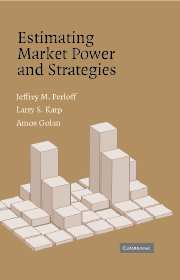Book contents
- Frontmatter
- Contents
- Foreword
- 1 Introduction and overview
- 2 Structure–Conduct–Performance
- 3 Industry Models of Market Power
- 4 Differentiated-Product Structural Models
- 5 Strategic Reasons for a Dynamic Estimation Model
- 6 Dynamic Games Involving Economic Fundamentals
- 7 Estimation of Dynamic Games Involving Economic Fundamentals
- 8 Estimation of Market Power Using a Linear-Quadratic Model
- 9 Estimating Strategies: Theory
- 10 Estimating Strategies: Case Studies
- Statistical Appendix
- Bibliography
- Answers
- Index
6 - Dynamic Games Involving Economic Fundamentals
Published online by Cambridge University Press: 04 June 2010
- Frontmatter
- Contents
- Foreword
- 1 Introduction and overview
- 2 Structure–Conduct–Performance
- 3 Industry Models of Market Power
- 4 Differentiated-Product Structural Models
- 5 Strategic Reasons for a Dynamic Estimation Model
- 6 Dynamic Games Involving Economic Fundamentals
- 7 Estimation of Dynamic Games Involving Economic Fundamentals
- 8 Estimation of Market Power Using a Linear-Quadratic Model
- 9 Estimating Strategies: Theory
- 10 Estimating Strategies: Case Studies
- Statistical Appendix
- Bibliography
- Answers
- Index
Summary
We now focus on games in which dynamics arise because of changes in economic fundamentals. This type of game is often referred to as a dynamic game or a stochastic game. When agents move in continuous time, rather than at discrete stages, it is often called a differential game. Hereafter we use the term dynamic game, where it is understood that the dynamics involve (a change in) an economic fundamental and not only the kind of strategic dynamics considered in the previous chapter. In this chapter, we concentrate mainly on the economic theory of these models. In the following chapter, we concentrate on the estimation of these models.
Fundamental sources of dynamics complicate the estimation of market power. The presence of dynamics means that we have to be cautious about interpreting evidence of market power. In particular, the previously used Lerner index (the price–marginal cost difference divided by price) is not an appropriate measure of market power when a firm solves a dynamic problem. When the industry is dynamic, a competitive equilibrium does not, in general, require that price equals static marginal production cost; hence, the Lerner index may either understate or overstate the extent of market power. For example, in a dynamic competitive market for a nonrenewable resource, price equals marginal extraction costs plus the resource rent; in this case, a positive Lerner index does not imply imperfect competition.
- Type
- Chapter
- Information
- Estimating Market Power and Strategies , pp. 113 - 146Publisher: Cambridge University PressPrint publication year: 2007



